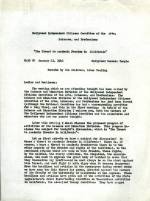|
Nowhere did anti-Communist fever hit harder than in California. There a former songwriter
turned state Senator, Jack Tenney, chaired a committee devoted to uncovering hidden
Communists. One of the groups they investigated was the Hollywood chapter of the ICCASP
-- the political action lobby in which Pauling now served as vice-president. Pauling
worked through late 1946 and early 1947 to get more scientists into the group, publishing
letters in which he exhorted his fellow researchers to take a stronger stand for what
they believed politically. "The problems that the world faces are great, serious,
and difficult," he wrote in the journal Chemical and Engineering News. "Chemists and other scientists have a social obligation which is greater than that
of the ordinary citizen. I hope that more and more chemists, in addition to carrying
on their professional activities as members of the American Chemical Society, will
also devote time and effort toward the solution of social and political problems."
Pauling’s efforts did not succeed in drawing many scientists to join. But they did
succeed in drawing attention to his own political work. Tenney’s committee began building
a file on Pauling, gathering information on his work with ICCASP, the FAS, and other
groups. Tenney then shared what he found with the FBI and the national House Committee
on Un-American Activities.
|
|
Click images to enlarge

Linus Pauling. 1946.

"The Threat to Academic Freedom in California." January 21, 1946.
"Emboldened by their initial publicity and to bolster the Communist cause in California,
this Communist front, Arts, Sciences and Professions Council, now announce that the
visiting Moscow propagandists will come to Los Angeles to stage a second propaganda
show on behalf of the Kremlin..."
|

